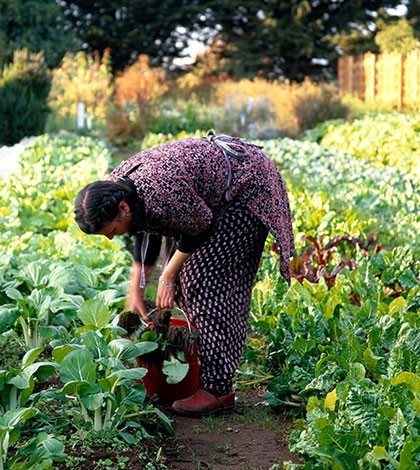An organic planting system developed by a Jesuit Priest is lauded as one of the most important developments for small scale farmers in 50 years.
Sumant Kumar, a farmer in the village of Darveshpura in northeast India’s state of Bihar, usually harvested four to five metric tons of rice per hectare, which is about the paddy yield average, worldwide. However, in 2011, with techniques that use organic fertilizer and no herbicides or GMOs, and which require less water and seeds, he astonishingly grew 22.4 metric tons, a world record, on just one hectare. Four of his friends from the village produced over 17 metric tons each. Moreover, six months later, a friend of Mr. Kumar’s surpassed the world record in growing potatoes, followed by a farmer in a nearby village setting an Indian record for growing wheat. In an area where the unpredictable weather conditions greatly influence the residents’ ability to produce an adequate food supply, a type of farming creating such astounding results was cause for celebration. Showing support of the methodology, the Bihar government acknowledged Mr. Kumar and he was also mentioned in the Indian parliament. Moreover, in 2014, Bihar will invest US$50 million in expanding adoption of this ingenious development called System of Rice Intensification or SRI.
Now practiced in over 50 countries in Asia, Africa, and Latin America, SRI has been lauded as among the most important advancements in the past 50 years for the 500 million small-scale farmers around the world and the two billion people who rely on them. It was developed in the 1980s in Madagascar by Jesuit priest and agronomist Father Henri de Laulanié, after viewing the rice-growing practices of the villagers. Its four main principles are: “1) early, quick and healthy plant establishment; 2) reduced plant density; 3) improved soil conditions through enrichment with organic matter; and 4) reduced and controlled water application.” Farmers thus plant fewer rice seedlings, spacing them further apart; use less water; apply abundant organic fertilizer; and aerate the soil to stimulate root growth and allow for more nutrients to reach the roots. SRI has also been effectively adapted to a variety of crops other than rice, such as wheat, potatoes, sugar cane, yams, tomatoes, garlic, and eggplant, showing a significant yield increase.
Dr. Norman Uphoff, PhD, an American professor and former director of the International Institute for Food, Agriculture and Development at Cornell University in New York, USA has led the effort to share SRI’s benefits worldwide. He is the Senior Advisor for SRI International Network and Resources Center (SRI-Rice) at Cornell University. Dr. Uphoff said, “Agriculture in the 21st century must be practiced differently. Land and water resources are becoming scarcer, of poorer quality, or less reliable. Climatic conditions are in many places more adverse. SRI offers millions of disadvantaged households far better opportunities.”
Our sincere appreciation, all involved farmers, governments, Dr. Norman Uphoff, and individuals and organizations such as SRI International Network and Resources Center, for your work in promoting the Earth-friendly techniques of Father Henri de Laulanié for the benefit of humanity. May vegan organic farming soon be the norm, providing safe, healthy, and abundant plant-based food for all.
 The Supreme Master Ching Hai
The Supreme Master Ching Hai


